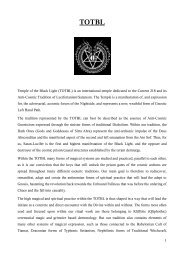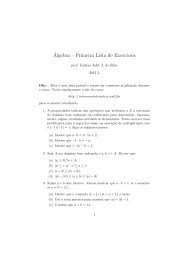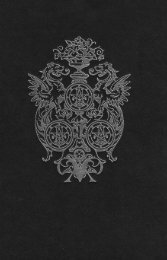Satanism Today - An Encyclopedia of Religion, Folklore and Popular ...
Satanism Today - An Encyclopedia of Religion, Folklore and Popular ...
Satanism Today - An Encyclopedia of Religion, Folklore and Popular ...
Create successful ePaper yourself
Turn your PDF publications into a flip-book with our unique Google optimized e-Paper software.
132 Jinn<br />
Samuel. Its Structure in Relation to <strong>An</strong>cient<br />
Near Eastern Dreams <strong>and</strong> Its Theological<br />
Significance. Lanham, MD: University Press <strong>of</strong><br />
America, 1984.<br />
Kramer, Kenneth P. Death Dreams. Unveiling<br />
Mysteries <strong>of</strong> the Unconscious Mind. New York:<br />
Paulist Press, 1993.<br />
Jinn<br />
According to the Muslims, the jinn (from which<br />
we get the English term genie) are invisible spirits<br />
made out <strong>of</strong> fire, who were created 2,000 years<br />
before Adam. Islamic thinkers postulated three<br />
orders <strong>of</strong> being beyond God: angels, jinn, <strong>and</strong><br />
humanity. The angels, who were created out <strong>of</strong><br />
light, are closest to God. The jinn, who are intermediate<br />
between angels <strong>and</strong> humanity, inhabit a<br />
subtly material or etheric realm. Like human<br />
beings, the jinn possess intelligence <strong>and</strong> free will,<br />
<strong>and</strong> are thus capable <strong>of</strong> being saved. For this<br />
reason, the Koran sometimes explicitly addresses<br />
itself to both humans <strong>and</strong> jinn. It is said that one<br />
night a group <strong>of</strong> jinn overheard the Prophet reciting<br />
the Koran <strong>and</strong> became believers. The spot<br />
where Muhammad later met with the jinns’<br />
leaders <strong>and</strong> accepted their allegiance is the site <strong>of</strong><br />
the Mosque <strong>of</strong> the Jinn in Mecca.<br />
Iblis, the Islamic Satan, was transformed from<br />
an angel into a jinn when he refused God’s<br />
comm<strong>and</strong> that he worship Adam (who was<br />
created out <strong>of</strong> mere clay). Subsequently, Iblis <strong>and</strong><br />
other angels who shared his viewpoint were<br />
removed from their stations. Iblis <strong>and</strong> the jinn<br />
were exiled from Eden <strong>and</strong> subsequently became<br />
demons. (Also included amongst the outcasts<br />
were five <strong>of</strong> Iblis’s sons.) Ejected from the presence<br />
<strong>of</strong> God, these former angels turned to trickery <strong>and</strong><br />
causing trouble for mortals.<br />
One example <strong>of</strong> good behavior by the jinn is<br />
when Aladdin, in the book Arabian Nights, is<br />
assisted by a friendly jinni (genie) when he rubs<br />
his magical lamp. The jinn were also referred to<br />
as good spirits in A Dictionary <strong>of</strong> Islam, by<br />
Thomas P. Hughes. The entry (under “Genii”)<br />
states: “The most noble <strong>and</strong> honorable among<br />
the angels are called the Ginn, because they are<br />
veiled from the eyes <strong>of</strong> the other angels on<br />
account <strong>of</strong> their superiority.”<br />
See also Iblis; Islam<br />
For Further Reading:<br />
The Encyclopaedia <strong>of</strong> Islam. Leiden: E. J. Brill, 1978.<br />
Glassé, Cyril. The Concise <strong>Encyclopedia</strong> <strong>of</strong> Islam. San<br />
Francisco: Harper San Francisco, 1989.<br />
Johnson, Robert<br />
One <strong>of</strong> the best-known legends in American folk<br />
music concerns the deal with the devil that bluesman<br />
Robert Johnson is said to have made at a<br />
Mississippi crossroads one midnight. At least one<br />
blues scholar maintains that the story is more<br />
urban legend than rural folklore—the romantic<br />
concoction <strong>of</strong> white blues fans decades later—but<br />
some evidence suggests that the tale was in circulation<br />
during Johnson’s lifetime.<br />
To many religiously inclined African-Americans<br />
in the South, the blues was the “Devil’s music,” <strong>and</strong><br />
those who performed it were placing their souls in<br />
peril. Some blues performers, however, happily<br />
took on the persona <strong>of</strong> the bad man in league with<br />
the Devil. Early bluesman William Bunch, for<br />
example, billed himself as Peetie Wheatstraw, the<br />
“Devil’s Son-in-Law” <strong>and</strong> the “High Sheriff <strong>of</strong> Hell”<br />
(Oliver 1975, 89). It was rumored that some, such as<br />
Mississippi’s Tommy Johnson (no relation to<br />
Robert Johnson) <strong>and</strong> the Carolinas’ Gary Davis<br />
(though the latter subsequently became a Christian<br />
minister), had sold their souls to Satan in order to<br />
attain superior musical skills. (On the other h<strong>and</strong>,<br />
the great Mississippi guitarist <strong>and</strong> Robert Johnson<br />
mentor Son House played blues <strong>and</strong> preached, even<br />
writing the classic “Preachin’ the Blues.”)<br />
Among the most influential figures in blues<br />
history, Robert Johnson, who usually played solo<br />
acoustic guitar, “made the instrument sound<br />
uncannily like a full b<strong>and</strong>,” in the words <strong>of</strong> Robert<br />
Palmer, “furnishing a heavy beat with his feet,<br />
chording innovative shuffle rhythms, <strong>and</strong> picking<br />
out a high, treble-string lead with his slider, all at<br />
the same time. Fellow guitarists would watch him<br />
with unabashed, open-mouthed wonder. They<br />
were watching the Delta’s first modern bluesman<br />
at work” (Palmer 1981, 117). Johnson was born in<br />
Hazlehurst, Mississippi, on May 8, 1911. He grew<br />
up in the Delta <strong>and</strong> spent a few years in Memphis<br />
before returning to Mississippi. He picked up the<br />
Jew’s harp, then graduated to the harmonica <strong>and</strong>
















